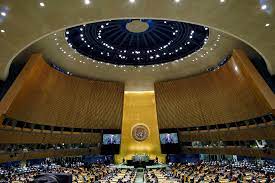UN hikes flash appeal to $816mn to support flood affected people of Pakistan

Islamabad: The United Nations has upscaled its humanitarian appeal for the flood affected people of Pakistan to $816 million from previous $160 million assistance, considering a multitude of rehabilitation and health -related issues, cropping up in the post flood situation.
The revised appeal was made for Pakistan on the basis of updated on ground need assessment of the flood situation in the country. The revised ‘2022 Pakistan Floods Response Plan’ (FRP) was shared with UN member states and humanitarian organizations in Geneva.
The revised appeal urgently seeks US $ 816 million to respond to the growing lifesaving needs of the people – a jump of US $ 656 million from the initial appeal of US $160 million, a joint press release said.

This increase is a reflection of the rising needs and the unprecedented scale of destruction caused by the current climate-induced disaster which has affected a population of 33 million, cost 1,600 lives and threatens hundreds of thousands more as a second disaster looms within the first one.
Over 2 million homes have been destroyed or damaged, forcing people to live under open skies exposed to threats of dengue, malaria, and the biting cold of the fast-approaching winter.
More than 1,500 health and support facilities were badly damaged and unable to respond to the growing needs. 13,000 km of roads were badly damaged, making it extremely difficult – and, at times, impossible – to reach families in need.
The focus of this appeal was on the provision of urgent and lifesaving humanitarian assistance and protection to 9.5 million people until 31 May 2023, with a focus on the 34 most affected districts in Balochistan, Sindh, Khyber Pakhtunkhwa and Punjab.
This prioritization is based on the number of houses damaged and destroyed, available projections of water level changes, and the population of displaced people in the districts.

It aimed to enable a more cohesive response for people in areas that have been most severely affected, and to foster a focused, multi-sectoral approach.
The international community including UN member States, UN agencies, and international humanitarian organizations participated in the event and delivered statements of solidarity and support for the people of Pakistan, in the wake of the climate-induced catastrophe.
An initial US $160 million flash appeal was made to address immediate needs based on estimates just a month ago.
The support of the international community to the initial appeal of US $ 160 million allowed the humanitarian community to respond to immediate life-saving needs. However, the results of the recent needs assessments, that led to up-scaling of the Flash Appeal to US $ 816 million, revealed that much more was needed to save those struggling to survive the aftermath of the floods.
The Government of Pakistan, the United Nations, humanitarian and philanthropy organizations, and local communities have been working hard to provide assistance to flood-affected areas across Pakistan.
Under-Secretary-General for Humanitarian Affairs Martin Griffiths in his remarks said, “People in Pakistan are bearing the brunt of the climate crisis, where catastrophic flooding has taken a devasting toll on the most vulnerable. We are now in a race against time ahead of the winter season and funding is now urgently needed so humanitarians can prepare to respond to rising health, hunger and other debilitating needs.”
WHO Director-General Dr. Tedros Adhanom Ghebreyesus, on the occasion said, “The water has stopped rising, but the danger has not, we are on the verge of a public health disaster. Many more lives that were lost in the floods could be lost in the coming weeks if we don’t mobilize greater support for Pakistan. WHO will do everything we can to support the people of Pakistan now, and in the coming months and years as you recover and rebuild. And even as we respond to the emergency in Pakistan, we must remember that unless we address the existential threat of climate change, we will be responding to emergencies like this and worse more often.”





